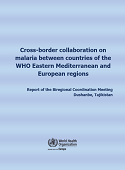Cross-border collaboration on malaria between countries of the WHO Eastern Mediterranean and European regions (2020)

Download
The Biregional Coordination Meeting, held in Dushanbe, Tajikistan, on 27–28 November 2019, brought together countries of the WHO Eastern Mediterranean and European regions that share borders; the aims of the meeting were to report on their activities in eliminating malaria and preventing re-establishment of malaria transmission, to share lessons learned and discuss challenges, and to develop solutions, especially on cross-border issues. In addition to malaria, both the Eastern Mediterranean and the European regions have witnessed, in recent years, outbreaks of emerging and re-emerging vector-borne diseases (VBDs) – principally, the mosquito-borne arboviral diseases West Nile virus, dengue and chikungunya. The rapid expansion of the distribution of Aedes aegypti and Aedes albopictus – vectors of dengue, chikungunya and Zika virus – in these regions is alarming and poses a significant risk to public health. To tackle this issue, possible interregional collaboration on capacity strengthening for integrated vector surveillance and control was discussed at length.
Participants reaffirmed their commitment to make efforts to achieve malaria elimination and maintain malaria-free status, to strengthen capacity for integrated vector surveillance and vector control, and to improve their preparedness for emerging VBDs. The need for countries to be fully supported in these efforts was emphasized.



